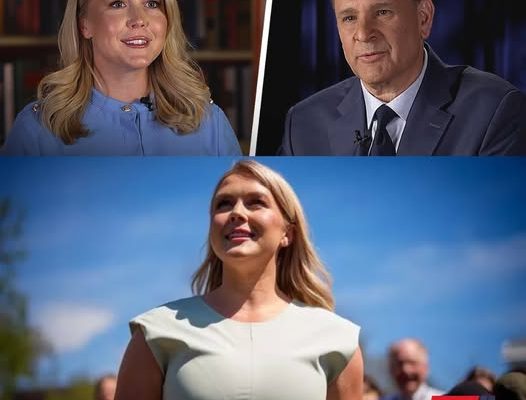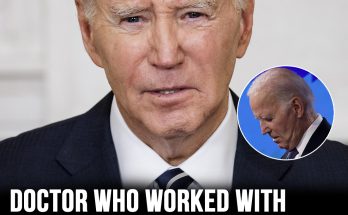This narrative blends factual moments with reflective interpretation to capture the emotional and cultural significance of Karoline Leavitt’s public conversation.
(Opening: Interview with David Brody, 2025)
From the first question—”How many hours do you actually sleep?”—Karoline Leavitt smiled and leaned in. Her answer was quick: “About five to six hours,” before quoting Donald Trump: “When you love what you do, you don’t need much sleep.” And that, in many ways, set the tone for what followed: a portrait of a press secretary who wears exhaustion like a badge of honor—and faith like armor.
Between Motherhood and the Briefing Room
Though she is often seen behind the podium facing the press, Leavitt reminded the audience of the title that defines her more: mother. “The emotional challenge is real,” she admitted. “When I’m with my son, I worry about the job. When I’m at work, I long to be home.” But she is learning to say no, she said, to protect time for her son—and relies on a strong support system: a husband she calls “an incredible father” and a mother who visits often.
The Blue-Collar Roots That Shaped Her
Leavitt’s upbringing wasn’t political. It was working-class. Her parents ran a small business. Neither attended college. Her father worked 12-hour days, seven days a week. “It left a permanent imprint,” she said, describing how those early years instilled a lifelong respect for hard work, discipline, and persistence. “Watching them work to survive taught me everything I needed to carry into this job.”
Faith as Compass in a Hostile Arena
Leavitt speaks of her Catholic education with reverence. “It shaped me,” she said, describing the structure and discipline it gave her—first in school, then at Saint Anselm College, a Catholic university in New Hampshire. There, she found not only intellectual formation, but spiritual clarity.
When asked about her decision to pray before press briefings, Leavitt didn’t hesitate: “It’s our time to ask for clarity, for courage, for protection.” She added, “It’s the one moment of peace before stepping into a storm.”
“This Is a Spiritual War”
When asked if she believes America is in the midst of a spiritual battle, Leavitt answered without flinching: “Absolutely.” She pointed to what she called “spiritual warfare,” especially during the Trump campaign. “There is evil in the world,” she said, “but God is sovereign.”
Referring to the July 13, 2024, assassination attempt on Donald Trump, Leavitt said, “I believe he was saved for a reason. Just like all of us are here, now, for a reason.”
From Campaign Loss to Divine Assignment
Leavitt opened up about her failed congressional bid in 2022—how painful it was to lose after winning the primary, and how, at the time, she questioned everything. “I thought that was the door I was meant to walk through,” she reflected. “But now I see it differently. If I hadn’t lost, I wouldn’t have joined President Trump’s campaign, and I wouldn’t be here today.”
She credits that moment with deepening her faith. “God was saying, ‘Not yet. I have something else for you.’”
A Gen Z Voice for Faith and Country
As one of the youngest press secretaries in U.S. history, Leavitt represents a generational shift. And she’s not alone. Across campuses nationwide, she notes a revival stirring.
“There’s something happening. Students praying publicly, baptisms on college lawns—this generation isn’t ashamed to believe.”
She attributes this wave to hunger—for clarity, for purpose, for truth. “Faith is filling a vacuum that politics and culture have left empty.”
The Role of Trump in the Revival
Leavitt doesn’t hesitate to credit Donald Trump as a catalyst. “He believes in young people,” she says. “He fights for their future.”
She also believes his unapologetic defense of religious liberty is emboldening faith leaders and communities across the country. “It’s no accident we’re seeing this now—not after four years of secular erosion. It’s a spiritual reawakening.”
Bringing Faith into the West Wing
Perhaps the most striking change, Leavitt says, is what’s happening inside the White House itself. Under the guidance of Paula White, Trump’s longtime spiritual advisor, the West Wing now houses an Office of Faith Initiatives.
“It’s not symbolic. It’s structural,” she explained. “We’ve brought worship back to the halls of power.”
Weekly prayer meetings, multifaith listening sessions, and chapel services have become routine. “We’re not forcing religion—but we’re refusing to hide it.”
A Mission Bigger Than Politics
For Leavitt, this job is about more than talking points. “I’m not here just to defend a policy. I’m here to tell the truth.”
She sees herself as a bridge—between a skeptical press corps and a public craving clarity. And she measures success not in praise, but in conviction.
“If I walk off that podium knowing I honored my faith, my president, and the people—then it was a good day.”



